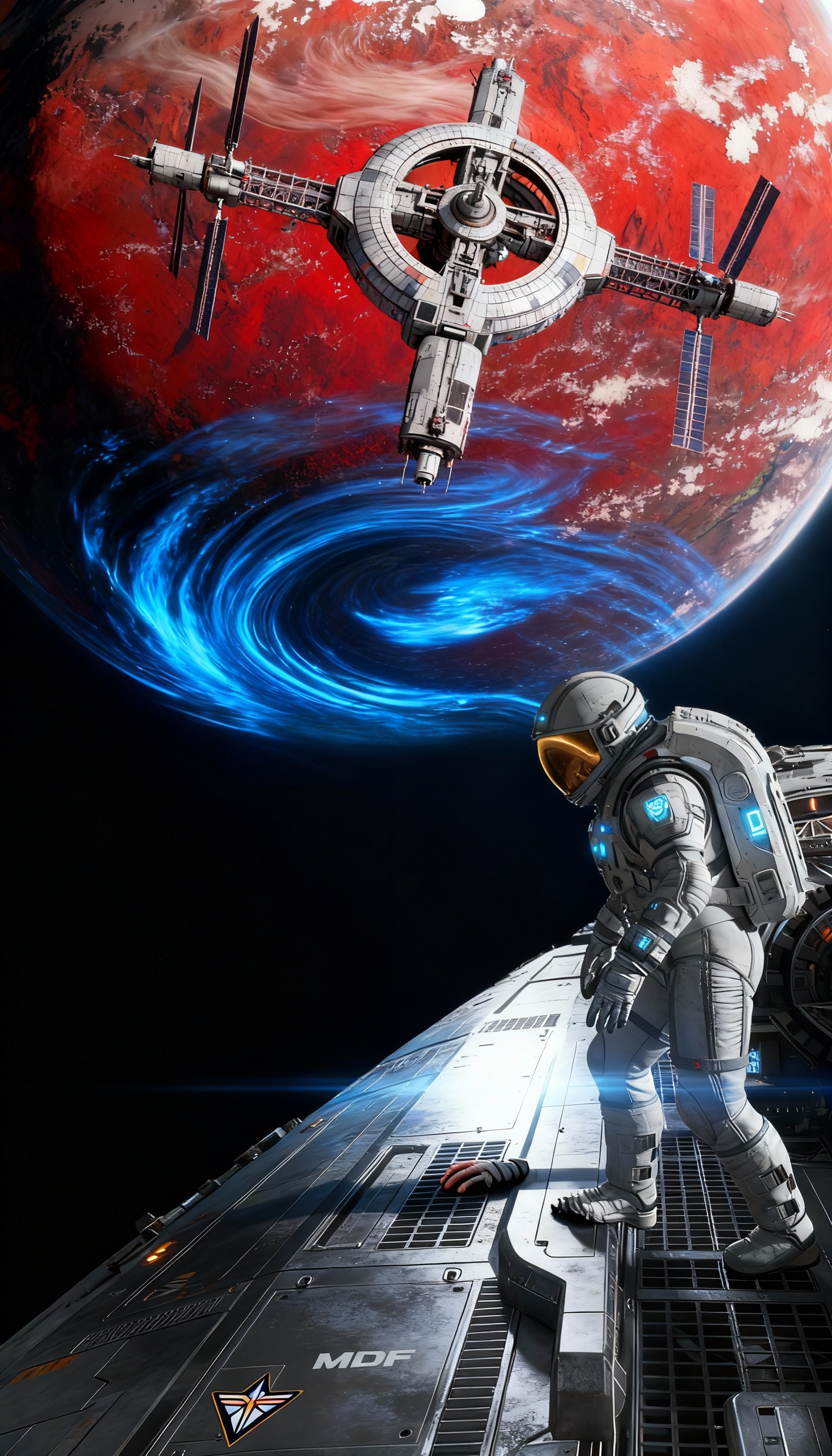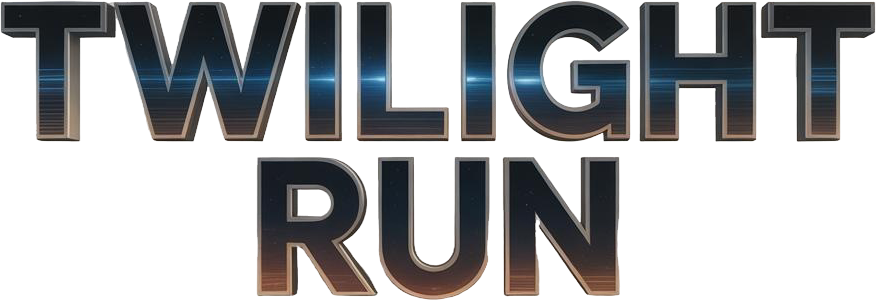Cold Orbit

Day 1: Cold Orbit
You never forget the sound a ship makes when her hull cools after reentry. It’s like the old girl’s sighing. If you’ve built one yourself, you can tell what kind of night it’ll be from that sound. Tonight, the Caliban sounds uneasy.
I’m Senior Structural Tech Rian Velez, Terran born, forty-seven standard years. Outer Colonial Defense Net, MDF ship Caliban. We’re parked high over Port Helena — dust, rock, and wind pretending to be a colony. The locals don’t want us here, but they want what’s coming even less.
Pittman went dark three weeks back. Two weeks after that, our atmospheric sensors started picking up strange echoes — pressure waves that don’t belong in any weather model. Nobody agrees on what they mean. Nobody likes the options.
1. Duty Shift
0600 hours. Smell of old coffee and coolant. Dorsal frame deck, section C — thirty meters of bad access and worse lighting. I’m halfway through a seam weld when Ensign Danel yells over the comm, “Velez, you still chasing that crack on frame twelve?”
“She creaks, I fix,” I say. “You want her blowing out in atmo, be my guest.”
He laughs, station-born, never felt real gravity. Kids like him think planets are just stories old Terrans tell. They don’t understand what dirt under your boots feels like, or how it pushes back.
The repair drones hum past. Good machines, but I still trust my hands more. You can hear stress in metal if you’ve got the ear for it — the difference between expansion strain and a hairline crack. Drones don’t listen. They just follow specs.
By 0800 the ship’s humming. We’ve got three sweeps around the planet and one check-in with the surface base. Commander Tseng keeps the calls short. She’s Terran too, but her voice has that Colonial drag now — vowels long, patience short. The colonists hate seeing MDF colors overhead. Every ship in orbit means another delay in freight and another rumor about haunted skies.
2. Rumors in the Mess
1200 hours. Mess hall smells like reheated protein and recycled air. The newsfeed loops Bureau footage from Pittman — cloud systems folding into perfect spirals, lightning that climbs instead of falls.
“That’s not weather,” Chief Tora says around a forkful of stew. “You don’t get symmetry like that without intent.”
Someone down the table mutters, “ Geo forming tech. Has to be.”
“No,” I say before I can stop myself. “the arrays collapse inward. These are climbing. That’s not them.”
“Then who?”
“Someone with the tools and the arrogance to play with the sky,” I tell them. “That’s usually us.”
Tora snorts. “You talk too much for a wrench-jockey.”
She’s right. But the footage keeps rolling — silver curls in the clouds, lightning-like veins under skin — and I can’t shake the feeling the Caliban’s hull is already answering to it.
3. Down to Helena
1700 hours. Command sends me and Danel planet side. Shuttle Mercury Two rattles like a tin can full of bolts but still gets us down. Port Helena stretches around the crater rim — prefab domes, heat vents, and stubborn people.
The air tastes like rust. Locals watch us walk past. Relief on one face, resentment on the next. Soldiers mean trouble, and trouble always finds soldiers first.
Commander Tseng meets us at the ridge outside the dome. “You’re here about the disturbances,” she says.
“Yes, ma’am.”
She points toward the horizon. “Watch.”
For a moment, it’s heat shimmer. Then the sky flexes. The air ripples outward like fabric tugged by invisible hands. My suit sensors spike, pressure dropping across three bands at once.
“That’s every fourteen hours,” Tseng says. “It’s not seismic. Whatever it is, it’s coming from above the ionosphere.”
I record it, trying to keep my voice steady. Some part of me knows this isn’t just weather. It’s intent.
4. The Signal
Back aboard Caliban, I run diagnostics on the readings. The pulse isn’t random. It’s structured — primes, repeating: 7, 11, 13, 17.
Jin from comms leans over my shoulder. “That’s not noise.”
“No. It’s a handshake.”
“You think someone’s calling us?”
“Not us. Through us.”
The waveform stabilized, pulsing in patterns that felt deliberate. Then Eidolon broke in. “Unidentified signal shares point four percent correlation with known Cetian subspace protocols.”
Jin leaned closer. “Cetian? That can’t be right.”
“Correlation confirmed,” Eidolon said. “Signal origin indeterminate. Cross-reference incomplete.”
I frowned. The Cetians aren’t ghosts; they keep to their own lanes, trade when they must, vanish when the politics start. They don’t transmit blind into Terran channels. Not ever.
“Could it be a relay?” Jin asked.
“Maybe. Or someone wants us to think it’s Cetian.”
That was worse. The Cetians might be secretive, but they’re predictable. This signal wasn’t. It carried intent — and a kind of precision that felt uncomfortably human.
“Correction,” Eidolon says. “Official contact ceased. Presence probability nonzero.”
The Cetians were quiet types. Spoke in math, built things we barely understood, then left when we started copying them too well. If they’re talking again, something’s changed — and not in our favor.
5. The Breach
0330 hours. Klaxon. The deck shakes before I’m fully awake.
“Hull breach?”
“Negative,” Danel shouts. “Orbital net’s collapsing. Something’s punching through the defense grid.”
On the monitors, the field around Helena ripples like water. A blue flare blooms outward, steady, controlled.
“Source?”
“Above the magnetosphere,” Eidolon says. “Same signature as your signal.”
The light contracts and disappears. For three heartbeats, every sensor goes dark. When they come back, there’s something new in orbit — not a ship, more like architecture. Black spires turning slow, precise, deliberate.
Weapons comes over the line. “Orders?”
“Hold fire,” Captain Halden says. “Until we know what it is.”
The object rotates once. The frequency rises. My console fills with cascading symbols — geometry that shouldn’t exist.
Then a voice cuts through comms. Calm. Cold.
Terrans. You build storms and forget the sky was never yours.
Silence. The thing disassembles itself, dissolving into dust that scatters across the orbital grid.
6. Aftermath
We keep station. No casualties on Helena, but the weather’s broken — pressure doubled, wind moving backward. The MDF calls it a containment event. The Guild channels are already calling it the Second Warning.
I don’t know what to call it. Maybe a reminder. We think we own the lanes, the worlds, the physics. Maybe the universe was just waiting to remind us who wrote the rules.
Now the hull’s cooling again. Quieter this time. Almost peaceful. I press my hand to the frame and listen, just in case she’s trying to tell me what comes next.
